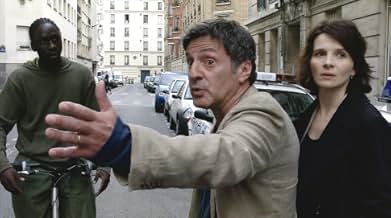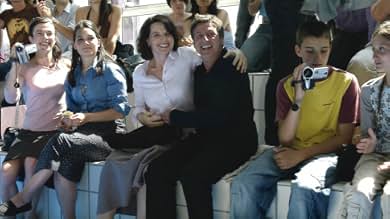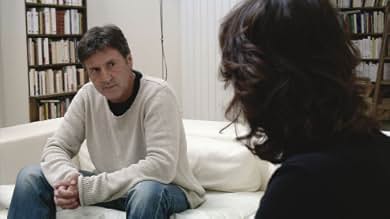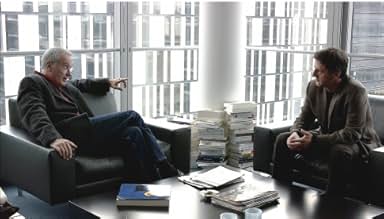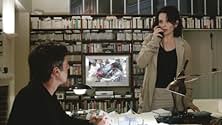Un matrimonio es aterrorizado con una serie de videos de vigilancia que aparecen en la puerta de su casa.Un matrimonio es aterrorizado con una serie de videos de vigilancia que aparecen en la puerta de su casa.Un matrimonio es aterrorizado con una serie de videos de vigilancia que aparecen en la puerta de su casa.
- Premios
- 29 premios ganados y 37 nominaciones en total
- Dirección
- Guionista
- Todo el elenco y el equipo
- Producción, taquilla y más en IMDbPro
Opiniones destacadas
If you've just seen "Cachê" and are still (understandably) in shock, not knowing whether you really liked it or not, let me ask you a few questions. Now, when was the last time a film:
a) had you glued to your seat as in "Caché", your eyes and neurones required to work in full gear from beginning to end, making it impossible to erase it out of your mind (instead of the instantly forgettable films you see every week), and actually making a second viewing almost compulsory?
b) posed such complex, multi-layered questions -- socio-political ones (the shameful, violent legacy of past and present imperialist nations, the manipulation of "reality" by the State and the media), existential ones (the racial, class and social prejudices that we all carry and have to fight within ourselves), and more prosaic ones, like trying to solve a complicated thriller? When were they so masterly interwoven?
c) made you aware that your explanation for the movie's most immediate, "practical" question (who's sending the tapes to Georges) will be influenced by your own background and prejudices?
d) had such a controversial and rich ending? (I could think of at least five possible denouements, even considering that I DID see the two boys -- q.v. the multiple theories about the ending in "Caché"'s message boards here in IMDb).
"Caché" is one of the few real masterpieces of the 2000s. The mix of socio-political comment with the thriller genre is not new, of course (you can go back at least to great German silent films by Lang, Murnau, Dieterle, Pabst). In 2005 alone, Cronenberg made the half-successful "A History of Violence", Spielberg the underachieved "Munich", Stephen Gaghan the overwrought "Syriana", Paul Haggis the soap-operatic "Crash". But Haneke asks us and gives us much more: he demands our ability to fill in the many important historical and political gaps, messes with our prejudices but respects our intelligence, and knows that a good part of us viewers are bored to death of being spoon-fed with one-digit I.Q. plots in mechanical thrillers inhabited by tired, phony "archetypes" of good x evil characters.
"Caché" is a monumental proof of Haneke's COMPLETE command of his craft. Artistic achievements like this are now SO rare in films that "Caché" feels like a happening -- a work of art that is mind-boggling, hypnotic and physically unnerving, ethically and esthetically disturbing, combining the sense of revelation and discomfort you get with the best political films with the braincells workout you get with the best thrillers.
As I left the theater, three masterpieces immediately came to my mind: Clouzot's "Le Corbeau" (a political statement disguised as a thriller and a probable inspiration for "Caché"), Antonioni's "The Passenger" (ditto, and also for the long, breathtaking, "open-meaning" last shot) and Resnais' "Marienbad" (the seminal film of multi-layered possible interpretations of "reality"). "Caché" stands tall on its own, reaffirming Haneke as one the top-5 working directors of the 2000s. Can't wait for his next film -- but while I do, I'll watch "Caché" one more time, and understand that hiding (Georges hiding his past and his feelings, nations hiding shameful parts of their history, Haneke hiding evidence, explanations and conclusions) can be a form of powerful revelation...and self-revelation.
a) had you glued to your seat as in "Caché", your eyes and neurones required to work in full gear from beginning to end, making it impossible to erase it out of your mind (instead of the instantly forgettable films you see every week), and actually making a second viewing almost compulsory?
b) posed such complex, multi-layered questions -- socio-political ones (the shameful, violent legacy of past and present imperialist nations, the manipulation of "reality" by the State and the media), existential ones (the racial, class and social prejudices that we all carry and have to fight within ourselves), and more prosaic ones, like trying to solve a complicated thriller? When were they so masterly interwoven?
c) made you aware that your explanation for the movie's most immediate, "practical" question (who's sending the tapes to Georges) will be influenced by your own background and prejudices?
d) had such a controversial and rich ending? (I could think of at least five possible denouements, even considering that I DID see the two boys -- q.v. the multiple theories about the ending in "Caché"'s message boards here in IMDb).
"Caché" is one of the few real masterpieces of the 2000s. The mix of socio-political comment with the thriller genre is not new, of course (you can go back at least to great German silent films by Lang, Murnau, Dieterle, Pabst). In 2005 alone, Cronenberg made the half-successful "A History of Violence", Spielberg the underachieved "Munich", Stephen Gaghan the overwrought "Syriana", Paul Haggis the soap-operatic "Crash". But Haneke asks us and gives us much more: he demands our ability to fill in the many important historical and political gaps, messes with our prejudices but respects our intelligence, and knows that a good part of us viewers are bored to death of being spoon-fed with one-digit I.Q. plots in mechanical thrillers inhabited by tired, phony "archetypes" of good x evil characters.
"Caché" is a monumental proof of Haneke's COMPLETE command of his craft. Artistic achievements like this are now SO rare in films that "Caché" feels like a happening -- a work of art that is mind-boggling, hypnotic and physically unnerving, ethically and esthetically disturbing, combining the sense of revelation and discomfort you get with the best political films with the braincells workout you get with the best thrillers.
As I left the theater, three masterpieces immediately came to my mind: Clouzot's "Le Corbeau" (a political statement disguised as a thriller and a probable inspiration for "Caché"), Antonioni's "The Passenger" (ditto, and also for the long, breathtaking, "open-meaning" last shot) and Resnais' "Marienbad" (the seminal film of multi-layered possible interpretations of "reality"). "Caché" stands tall on its own, reaffirming Haneke as one the top-5 working directors of the 2000s. Can't wait for his next film -- but while I do, I'll watch "Caché" one more time, and understand that hiding (Georges hiding his past and his feelings, nations hiding shameful parts of their history, Haneke hiding evidence, explanations and conclusions) can be a form of powerful revelation...and self-revelation.
The title of this engrossing and disturbing new Haneke film is ironic. At the end of the film, Georges Laurent (Daniel Auteuil) tells his wife Anne (Juliette Binoche) that he will be "caché," hidden, and he takes off his clothes, closes the curtains, and buries himself in bed. It's afternoon. But he will be exposed, as before. "Caché" is about how you can't hide. Auteuil, an actor who naturally looks worried and put-upon, and Binoche, who has a vulnerable and frightened look, play a privileged couple whose son Pierrot (Lester Makedonsky) at twelve is a star swimmer. Georges has a literary TV program (like "Le Bouillon de la Culture"), which, in France, makes him a star. They have a beautiful house in an elegant suburb of Paris. (His childhood home, we learn, was a substantial farm.) Beyond all that are the poor outskirts on the periphery of the French capital, the slums, the projects, the "banlieux," with their Arabs and blacks, French society's underprivileged and mistreated, unemployed and ignored, a population ready to explode into revolt -- as it very dramatically did in November 2005.
Like Haneke's previous "Code Unknown," "Caché" is primarily about alienation and connection. This sounds theoretical and intellectual, but the uncompromising Austrian who now makes his films in French always finds a deep emotional core in his people, in this case a core of the most infinite desperation in both perpetrator and victim. "Code Unknown" focused on chance meetings. "Caché" moves in closer to home, to this family whose peace is shattered and to another family that has never had peace. As the film begins the foreground family begins to receive increasingly menacing videos left on their doorstep that show they are being watched. Georges thinks he knows who it is.
"Caché" blends urban angst with the primal horror of Greek tragedy. What goes around comes around. For what he has explained was his starting point for the film, Haneke elliptically refers within it to the story of hundreds of Algerians the French cast into the Seine in 1961, a story recently unearthed and hitherto largely ignored. Within the film's foreground we discover that as a youth Georges himself betrayed an Algerian playmate in a way that effectively ruined his life. But the events that unfold are full of mystery and foreboding, and the relation between the Algerian, Majid (Maurice Bénichou), and Georges' current terror and disquiet largely remains uncertain. Is this a thriller? Maybe: it has a thriller's progressive unease, the suspense and pulse -- up to the end, anyway -- of a good whodunit. But Haneke, a great director in fine form here, has produced something as intellectually challenging as it is emotionally troubling. He operates without the help of surging background music, jump cuts, or snappy chases. And as the final credits roll, the closing long shot (upon which we are again voyeurs, as when the film began), shows us that nothing is resolved. A highly original artist, Haneke continues to explore.
Seen during its Paris run in October 2005. Shown first in the US at the New York and Chicago Film Festivals in October 2005. Opening in NYC and LA (US release title "Hidden") December 2005, limited US release January 2006. This is a highly visual film and should be seen if possible on a big screen.
Like Haneke's previous "Code Unknown," "Caché" is primarily about alienation and connection. This sounds theoretical and intellectual, but the uncompromising Austrian who now makes his films in French always finds a deep emotional core in his people, in this case a core of the most infinite desperation in both perpetrator and victim. "Code Unknown" focused on chance meetings. "Caché" moves in closer to home, to this family whose peace is shattered and to another family that has never had peace. As the film begins the foreground family begins to receive increasingly menacing videos left on their doorstep that show they are being watched. Georges thinks he knows who it is.
"Caché" blends urban angst with the primal horror of Greek tragedy. What goes around comes around. For what he has explained was his starting point for the film, Haneke elliptically refers within it to the story of hundreds of Algerians the French cast into the Seine in 1961, a story recently unearthed and hitherto largely ignored. Within the film's foreground we discover that as a youth Georges himself betrayed an Algerian playmate in a way that effectively ruined his life. But the events that unfold are full of mystery and foreboding, and the relation between the Algerian, Majid (Maurice Bénichou), and Georges' current terror and disquiet largely remains uncertain. Is this a thriller? Maybe: it has a thriller's progressive unease, the suspense and pulse -- up to the end, anyway -- of a good whodunit. But Haneke, a great director in fine form here, has produced something as intellectually challenging as it is emotionally troubling. He operates without the help of surging background music, jump cuts, or snappy chases. And as the final credits roll, the closing long shot (upon which we are again voyeurs, as when the film began), shows us that nothing is resolved. A highly original artist, Haneke continues to explore.
Seen during its Paris run in October 2005. Shown first in the US at the New York and Chicago Film Festivals in October 2005. Opening in NYC and LA (US release title "Hidden") December 2005, limited US release January 2006. This is a highly visual film and should be seen if possible on a big screen.
This was a very good film, an excellent study in psychological tension. Unfortunately, I don't think a lot of Americans or really anyone who isn't very familiar with the French-Algerian war will be able to understand it. It's about the horrors of that war and the French denial of their part in it -- very much tying in to the French youth race riots we saw last year. It also quietly draws some parallels with the war in Iraq. The ending was perhaps much too subtle. Everyone around me as we left the theater here in Los Angeles was expressing confusion. This was an older, more sophisticated audience, too. I don't think they really understood what was happening all along.
That said, it was still fantastic. I'm glad that at least outside of the U.S. it's gotten the recognition it deserves.
That said, it was still fantastic. I'm glad that at least outside of the U.S. it's gotten the recognition it deserves.
Michael Haneke the austere Austrian director of such critically acclaimed films as "Funny Games", "Code Unknown" and "The Piano Teacher" has created in "Caché" (Hidden) his finest film to date.
Starring Daniel Auteuil and Juliette Binoche the film is a taut and tense personal thriller, which examines important subjects such as guilt and responsibility in the context of western comfort.
Georges and Anne are a happily married middle class couple who both work in the arts. The balance of their lives is suddenly disturbed when they begin to receive video cassettes seemingly surveying the exterior of their home. Anne is quite dismissive of the tape but immediately Georges believes there is a sinister element to the tape. Soon they receive more tapes and disturbing drawings. As Georges fears for the safety of his family he suddenly has to confront his past and allow his wife to learn the hidden secrets of his past.
Haneke's film plays on one level like a common thriller, but it has much deeper psychological echoes as the "hero" George is revealed not to be quite the upstanding family man his family believed him to be. As his wife struggles to come to terms with the revelations their entire comfortable existence disintegrates.
Haneke is not just interested in creating a thriller however and the auteur expertly dissects George and Annes bourgeois life and implicates them both in the treatment by western culture of the east and the third world.
Acting in the film is terrific. Daniel Auteuil is simply excellent in his role, the actor manages to explore his character enough to make us forget it is a portrayal. Juliette Binoche as his wife initially seems not to be at the center of the film, but the stunning actress manages to place herself at the emotional center of the film as the wife and mother.
Expert supporting roles are provided by Maurice Benichiou, Annie Girardot and Nathalie Richard among others.
"Caché" is at once an intriguing thriller and a wonderful examination of guilt and responsibility in a very modern context.
Starring Daniel Auteuil and Juliette Binoche the film is a taut and tense personal thriller, which examines important subjects such as guilt and responsibility in the context of western comfort.
Georges and Anne are a happily married middle class couple who both work in the arts. The balance of their lives is suddenly disturbed when they begin to receive video cassettes seemingly surveying the exterior of their home. Anne is quite dismissive of the tape but immediately Georges believes there is a sinister element to the tape. Soon they receive more tapes and disturbing drawings. As Georges fears for the safety of his family he suddenly has to confront his past and allow his wife to learn the hidden secrets of his past.
Haneke's film plays on one level like a common thriller, but it has much deeper psychological echoes as the "hero" George is revealed not to be quite the upstanding family man his family believed him to be. As his wife struggles to come to terms with the revelations their entire comfortable existence disintegrates.
Haneke is not just interested in creating a thriller however and the auteur expertly dissects George and Annes bourgeois life and implicates them both in the treatment by western culture of the east and the third world.
Acting in the film is terrific. Daniel Auteuil is simply excellent in his role, the actor manages to explore his character enough to make us forget it is a portrayal. Juliette Binoche as his wife initially seems not to be at the center of the film, but the stunning actress manages to place herself at the emotional center of the film as the wife and mother.
Expert supporting roles are provided by Maurice Benichiou, Annie Girardot and Nathalie Richard among others.
"Caché" is at once an intriguing thriller and a wonderful examination of guilt and responsibility in a very modern context.
"Caché (Hidden)" uses the visual power of film to create an escalating examination of contemporary paranoia and personal global responsibility the way Francis Ford Coppola's 1974 film "The Conversation" did with sound and fictional criminals.
Writer/director Michael Haneke plays visual tricks on the audience as voyeurs from the opening shot, much as he did with "Code Inconnu," as he coyly plays with technology, building on the pervasive surveillance potential of our times.
The comfortable upper middle class life of married intellectuals Daniel Auteuil and Juliette Binoche is more and more disrupted by spooky video and drawings from some kind of stalker. With a bit heavy-handed constant background TV news coverage about terrorism and other violence in the MidEast, as well as too much irony that Auteuil works on TV (evidently in yet another book discussion show like the central narcissist in "Look At Me (Comme une image)"), race is quickly introduced as a flash point in contemporary Paris from a brief street confrontation and reinforced with Auteuil's flashback dreams of his youth.
While the political angles are obvious, the Hitchcockian tension is very effectively built up (though not narratively resolved even as some secrets are revealed that lead to other inscrutabilities), not just as we see Auteuil repeatedly lie and Binoche practically disintegrate from nerves, but through sudden violence.
While we never understand who all is lying and who isn't, the film further plays on the truth that visual images don't in fact communicate the reality of a situation and can be misleading about relationships, particularly once paranoia has destroyed trust. The film also raises the question if people change their behavior if they know they are being watched and that you can't really hide from your past. Cynically, but perhaps honestly as opposed to in "Crash," here there is no easy resolution of acceptance of guilt and responsibility in personal lives any more than there is in the legacy of colonialism and racism.
Not only is the past never dead, but the film keeps repeating issues of not just am I my brother's keeper, but the sins of the father are revisited on the sons, such that it's important to keep watching even as the credits start to appear at the end (there was much shouting when some folks got up to leave too soon, blocking cryptic clues to those behind them).
The subtitles are very poorly done, with many scenes having them white on white, instead of the much easier to read yellow.
Writer/director Michael Haneke plays visual tricks on the audience as voyeurs from the opening shot, much as he did with "Code Inconnu," as he coyly plays with technology, building on the pervasive surveillance potential of our times.
The comfortable upper middle class life of married intellectuals Daniel Auteuil and Juliette Binoche is more and more disrupted by spooky video and drawings from some kind of stalker. With a bit heavy-handed constant background TV news coverage about terrorism and other violence in the MidEast, as well as too much irony that Auteuil works on TV (evidently in yet another book discussion show like the central narcissist in "Look At Me (Comme une image)"), race is quickly introduced as a flash point in contemporary Paris from a brief street confrontation and reinforced with Auteuil's flashback dreams of his youth.
While the political angles are obvious, the Hitchcockian tension is very effectively built up (though not narratively resolved even as some secrets are revealed that lead to other inscrutabilities), not just as we see Auteuil repeatedly lie and Binoche practically disintegrate from nerves, but through sudden violence.
While we never understand who all is lying and who isn't, the film further plays on the truth that visual images don't in fact communicate the reality of a situation and can be misleading about relationships, particularly once paranoia has destroyed trust. The film also raises the question if people change their behavior if they know they are being watched and that you can't really hide from your past. Cynically, but perhaps honestly as opposed to in "Crash," here there is no easy resolution of acceptance of guilt and responsibility in personal lives any more than there is in the legacy of colonialism and racism.
Not only is the past never dead, but the film keeps repeating issues of not just am I my brother's keeper, but the sins of the father are revisited on the sons, such that it's important to keep watching even as the credits start to appear at the end (there was much shouting when some folks got up to leave too soon, blocking cryptic clues to those behind them).
The subtitles are very poorly done, with many scenes having them white on white, instead of the much easier to read yellow.
¿Sabías que…?
- TriviaThere is no music, save for the theme on George's show, and background music at Anne's publishing party.
- ErroresDuring the tape where Georges pulls up in his car and parks at night the headlights clearly cast a huge distinct shadow of the camera on the wall.
- Citas
Georges Laurent: Isn't it lonely, if you can't go out?
Georges's Mom: Why? Are you less lonely because you can sit in the garden? Do you feel less lonely in the metro than at home? Well then! Anyway, I have my family friend... with remote control. Whenever they annoy me, I just shut them up.
- Créditos curiososThe opening credits appear over a shot of the husband and wife's house, but they appear one by one and in rows. By the time the credits are over they are all shown together, much like they would on a poster or in the credits section of a movie trailer.
- ConexionesFeatured in Smagsdommerne: Episode #3.13 (2006)
Selecciones populares
Inicia sesión para calificar y agrega a la lista de videos para obtener recomendaciones personalizadas
- How long is Caché?Con tecnología de Alexa
Detalles
- Fecha de lanzamiento
- Países de origen
- Sitio oficial
- Idioma
- También se conoce como
- Caché
- Locaciones de filmación
- 49 Rue Brillat-Savarin, Paris 13, París, Francia(Georges' house)
- Productoras
- Ver más créditos de la compañía en IMDbPro
Taquilla
- Presupuesto
- EUR 8,000,000 (estimado)
- Total en EE. UU. y Canadá
- USD 3,647,381
- Fin de semana de estreno en EE. UU. y Canadá
- USD 57,010
- 25 dic 2005
- Total a nivel mundial
- USD 16,197,824
- Tiempo de ejecución1 hora 57 minutos
- Color
- Mezcla de sonido
- Relación de aspecto
- 1.78 : 1
Contribuir a esta página
Sugiere una edición o agrega el contenido que falta

Principales brechas de datos
What is the Japanese language plot outline for Caché. El observador oculto (2005)?
Responda
